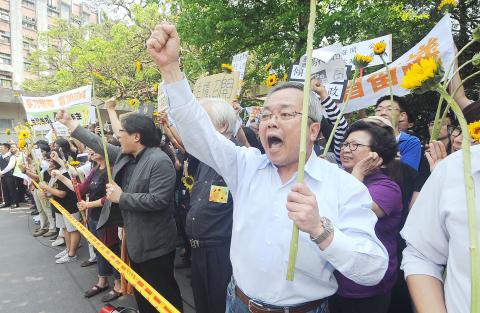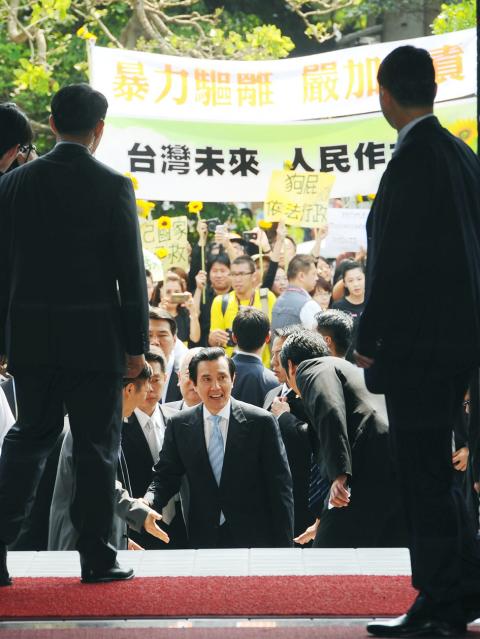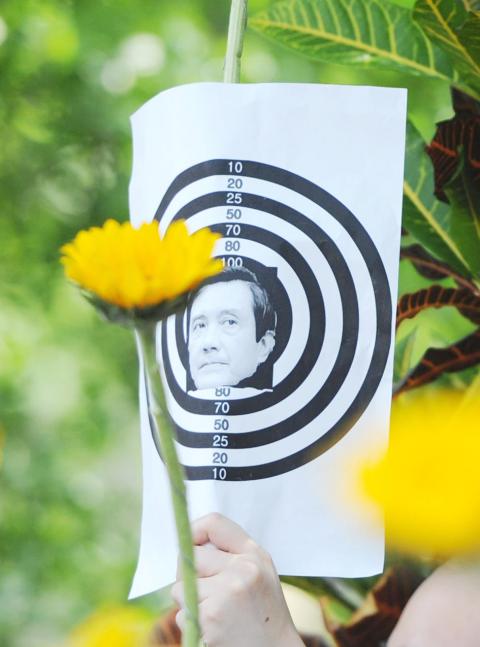Several hundred researchers at the Academia Sinica shouted appeals first made by the Sunflower movement at President Ma Ying-jeou (馬英九) yesterday when he visited the nation’s most eminent national research institution for an international conference about the Diaoyutai Islands (釣魚台) issue.
While Ma was giving the keynote speech at the conference, Chen Yi-shen (陳儀深) and Shiu Wen-tang (許文堂), associate research fellows at the college’s Institute of Modern History, and Paul Jobin, an associate professor at the University of Paris Diderot, silently held aloft posters with messages for the president.
The posters read: “Taiwan’s future, the people decide (台灣未來, 人民作主),” and “Cross-strait agreements, legislative oversight (兩岸協議, 立法監督).”

Photo: Liao Chen-huei, Taipei Times
“It is a good occasion to have the president look at what people have to say because apparently he did not listen to them at all” during the Sunflower movement, regardless of his recent pledge to reform the Chinese Nationalist Party (KMT), Shiu said by telephone last night.
Jobin said he attended the conference because he was interested in the topic and hoped to listen to exchanges of views between Ma and academics from Japan, China and Hong Kong.
“The reason I joined with my colleagues who prepared the banners was that I feel concerned for young people. They are so brave and committed to democracy in Taiwan, but were disregarded and treated badly by the government, which is trying to indict them,” Jobin said to the Taipei Times by telephone.

Photo: Chang Chia-ming, Taipei Times
He added: “I feel like we are going back to the nation’s bad times and I am concerned about the things that are going on in Taiwan.”
Jobin said he totally agreed with Ma’s reaction when former Japanese prime minister Yoshihiko Noda said to the UN in September 2012 that “there exists no issue of territorial sovereignty” over the Senkaku Islands, as the Diaoyutai Islands are named in Japan.
“President Ma said that: ‘Unless the relevant parties recognize that the dispute does exist, a resolution cannot possibly be reached.’ That is a very nice way of thinking. However, for the service trade agreement with China, he does not recognize there is a dispute. I hope he can act in accordance with his words,” Jobin said.

Photo: CNA
Jobin said that he was disappointed to see Ma leave after his speech without speaking with participants at the conference.
“I know he is a very busy man, but he could have stayed for five or 10 minutes. I think this is an indication of the way he understands democracy: He speaks a lot himself, but he does not listen to others.”
Kevin Chang (張谷銘), an associate research fellow at the Institute of History and Philology, said that there were 300 to 400 researchers, staff and students at a protest targeting Ma when he arrived at the Academia Sinica.
“It’s the first time in the country’s history that the Academia Sinica has assembled in a rally against a president,” Chang said.
They were led by sociologist Chiu Hei-yuan (瞿海源) and held sunflowers and banners while chanting slogans, including: “Restore constitutionalism, defend democracy (重建憲政, 捍衛民主).”
At one point after Ma had arrived, Chiu shouted at the police, who were trying to ward off the protesters and media: “This is the Academia Sinica, not the investigative bureau.”

AGING: As of last month, people aged 65 or older accounted for 20.06 percent of the total population and the number of couples who got married fell by 18,685 from 2024 Taiwan has surpassed South Korea as the country least willing to have children, with an annual crude birthrate of 4.62 per 1,000 people, Ministry of the Interior data showed yesterday. The nation was previously ranked the second-lowest country in terms of total fertility rate, or the average number of children a woman has in her lifetime. However, South Korea’s fertility rate began to recover from 2023, with total fertility rate rising from 0.72 and estimated to reach 0.82 to 0.85 by last year, and the crude birthrate projected at 6.7 per 1,000 people. Japan’s crude birthrate was projected to fall below six,

US President Donald Trump in an interview with the New York Times published on Thursday said that “it’s up to” Chinese President Xi Jinping (習近平) what China does on Taiwan, but that he would be “very unhappy” with a change in the “status quo.” “He [Xi] considers it to be a part of China, and that’s up to him what he’s going to be doing, but I’ve expressed to him that I would be very unhappy if he did that, and I don’t think he’ll do that. I hope he doesn’t do that,” Trump said. Trump made the comments in the context

SELF-DEFENSE: Tokyo has accelerated its spending goal and its defense minister said the nation needs to discuss whether it should develop nuclear-powered submarines China is ramping up objections to what it sees as Japan’s desire to acquire nuclear weapons, despite Tokyo’s longstanding renunciation of such arms, deepening another fissure in the two neighbors’ increasingly tense ties. In what appears to be a concerted effort, China’s foreign and defense ministries issued statements on Thursday condemning alleged remilitarism efforts by Tokyo. The remarks came as two of the country’s top think tanks jointly issued a 29-page report framing actions by “right-wing forces” in Japan as posing a “serious threat” to world peace. While that report did not define “right-wing forces,” the Chinese Ministry of Foreign Affairs was

PREPAREDNESS: Given the difficulty of importing ammunition during wartime, the Ministry of National Defense said it would prioritize ‘coproduction’ partnerships A newly formed unit of the Marine Corps tasked with land-based security operations has recently replaced its aging, domestically produced rifles with more advanced, US-made M4A1 rifles, a source said yesterday. The unnamed source familiar with the matter said the First Security Battalion of the Marine Corps’ Air Defense and Base Guard Group has replaced its older T65K2 rifles, which have been in service since the late 1980s, with the newly received M4A1s. The source did not say exactly when the upgrade took place or how many M4A1s were issued to the battalion. The confirmation came after Chinese-language media reported